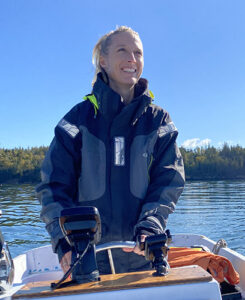Lauren Ross: Working with coastal Maine stakeholders to tackle real-world problems
Mitchell Center member profile
Mitchell Center members share a passion for tackling complex sustainability problems that matter to people and communities. They do this by collaborating with diverse stakeholders and working together across different areas of expertise because that’s what’s needed to meet today’s complex challenges. They seek to connect knowledge with action to create a brighter social, environmental, and economic future in Maine and beyond.
Learn more about who they are and what they do in this ongoing series of profiles.
 Dr. Lauren Ross is an assistant professor in the UMaine Department of Civil and Environmental Engineering. Her research focuses on the dynamics of water movement and transport of materials in Maine estuaries and coastal ecosystems. Lauren is deeply engaged with community stakeholders and seeks solutions to pressing challenges such as harmful algal blooms and water pollution.
Dr. Lauren Ross is an assistant professor in the UMaine Department of Civil and Environmental Engineering. Her research focuses on the dynamics of water movement and transport of materials in Maine estuaries and coastal ecosystems. Lauren is deeply engaged with community stakeholders and seeks solutions to pressing challenges such as harmful algal blooms and water pollution.
She co-leads the Watershed Process and Estuary Sustainability research group with Dr. Sean Smith and is taking an active leadership role in developing new initiatives for the Mitchell Center including expanding networking opportunities among researchers and stakeholders.
What problem/s are you working to solve?
My research involves understanding water circulation in coastal and estuarine systems due to tides, winds, waves, and river flows. I use this understanding to explain how, when, and why material is transported in these areas. In the Watershed Process and Estuary Sustainability (WPES) research group we are studying harmful algal blooms (HABs), coastal pollution, and microplastics, each of which can cause water quality issues on the coast of Maine. We want to better understand how these materials move around coastal areas and how long they will linger so that we can eventually help to forecast and mitigate water quality problems.
What progress are you making toward solutions?
Our work involves continual communication with our stakeholder partners to share progress and make sure we are working toward solutions that will be helpful and useful to them. The shape of our research is constantly evolving, and we try our best to adapt to new challenges as they arrive. Our team is currently working to develop a model forecasting tool that will predict where material in Frenchman Bay will be transported two days into the future, in hopes of helping stakeholders make science-based decisions surrounding water quality.
How could your work contribute to a more sustainable future in Maine and beyond?
We aim to help stakeholder partners that include the Maine Department of Marine Resources (MEDMR), local communities, shellfish harvesters, and shellfish aquaculture businesses to sustain the health of Maine’s coastal ecosystems and economy. Our forecasting tool can be used by MEDMR to streamline site selection for water quality sampling and will hopefully aid aquaculture businesses by anticipating closures due to HABs or pollution.
Why did you decide to join the Mitchell Center?
I want my research to help solve real problems that stakeholders in Maine coastal areas are dealing with, and that is what the Mitchell Center is all about! I feel very fortunate to be a part of such a dynamic and versatile group of faculty and students that are dedicated to sustainability research.
What’s the best part about collaborating with other researchers, and with stakeholders?
Getting to work with other researchers allows me to continually challenge my methods, findings, and interpretations, which makes our science stronger. And working with stakeholders is what makes our research efforts worthwhile. Being able to help the community to solve a tangible problem is very rewarding and motivates me to keep doing what I’m doing.
Where’s your favorite place in Maine?
Being on my boat in Frenchman Bay or Penobscot Bay.
What sustains you?
Being able to combine my love and passion for the ocean with research and student education. I always feel rejuvenated and motivated after a day of field work on the water, and I’m pretty sure every time I take students or colleagues out with me I say, “This is why I love this job!” I also believe that healthy lifestyle practices and relationships with loved ones sustain me (and coffee probably helps too).
